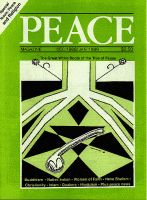
Peace Magazine Dec 1988-Jan 1989, page 7. Some rights reserved.
Search for other articles by Lois M. Wilson here
"I CAN IMAGINE MYSELF NOT A Westerner; I can imagine myself not white. I can even imagine myself having no wealth. But I cannot imagine what it would be like not to be a woman."
That remark, made by a participant in a meeting for women of nine world faith communities that took place last June in Toronto, summed up for many what we were about. The meeting was sponsored by the World Council of Churches, and was held in Toronto because it is a city increasingly conscious of the pluralistic nature of its citizens. Our various cultures, creeds, colors, and vocations were different. But our experience of being women united us.
We spoke of many things in that week. We produced no papers, no resolutions, no draft statements, had no main speakers, did not speak on behalf of the rest of humanity, and did not produce a blueprint for the future of humankind that we asked all to sign. Instead of our final session being taken up with debate and negotiation over what statements can really be agreed upon, we celebrated with singing and dancing and a commitment to continue talking with one another.
WE WERE LAYING THE GROUNDWORK for peacemaking. Creating the climate, if you like. For instance, personal friendships forged in such an encounter undermined forever the stereotypes we had of each other, no doubt bolstered by religious dogma and barriers. It was in our sharing of faith rituals that most stereotypes were shattered. Every day we absorbed, rather than simply observed, the particular ceremonies lying at the heart of each historic faith community. We did not do this with ease because religion has been used so often to make us very intensely aware of all that separates us from others. But it was in the sharing of rituals that we became most aware of our common experience as women. And this despite the fact that we came from nine religious traditions -- Jewish, Islamic, Buddhist, Hindu, Sikh, Baha'i, Christian, Native North American, and Covenant of the Goddess, and from as many countries.
In the emerging household of faiths, women are finding we have unique gifts to bring to the household arts of living peaceably together. One is the gift of listening. Another is the gift of abandoning hard core non-negotiable positions, fixed in stone, in order to be able to listen.
We began to tackle tough questions -- such as the religious possession of land; the religious wars in defence of a supposedly unique faith stance; and the ways in which religions have been used to sanction violence. There were people present from the West Bank and from Israel, from the Sudan and the Punjab. From them we began to learn about the cost of genuine peacemaking in areas where religion is so often used to sanction repression and mutual disrespect. The political realities out of which participants spoke became sharp reminders of how religion is used and abused to shape the identities of some peoples, and to deface and diminish the identities of others.
At the core of every faith represented there is a vision of "the peaceable kingdom." The lion and the lamb together is a symbol that is duplicated in every religion, albeit with different imagery. The symbolism of peace and openness to others is always in tension in all world religions with the need to withdraw from others who are different, in the interests of preserving some undeniable religious truth. The question is, which emphasis is appropriate in a given time?
One interesting session was on the authority of scripture and tradition, as we listened with bated breath to an Islamic female scholar open up the Koran to us in unexpected ways. We were aware that this meeting was probably the first one of its kind in history. And we were also aware that much of the interpretation of both scripture and tradition (i.e. authority) in all our communities has hitherto been done by men. What lies ahead for us is the hard work of digging out what patterns of violent behavior, what assumptions about war and peace have been inherited by us and have been prescribed by male interpretation. It was a heady experience to sense the commonality of our concerns and values.
AS ONE PARTICIPANT PUT IT, "SUPPOSING we all set down a statement stating, 'I have faith that. . .,' rather than 'I believe. . .'. I think we would find that the priorities of our concerns would be very similar." And so we found it to be -- particularly in the area of women and peacemaking.
Sixty-five women from nine faith communities, peacemaking. May their tribe increase!
The Very Rev. Lois M. Wilson is Former Moderator of the United Church of Canada.

Peace Magazine Dec 1988-Jan 1989, page 7. Some rights reserved.
Search for other articles by Lois M. Wilson here